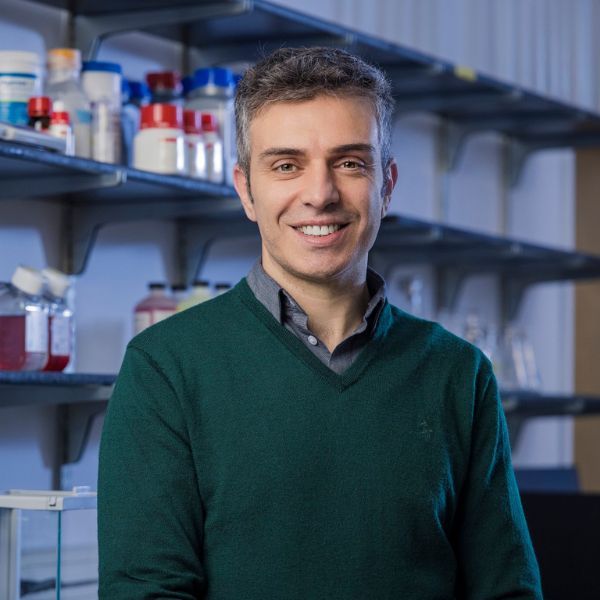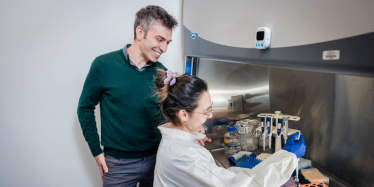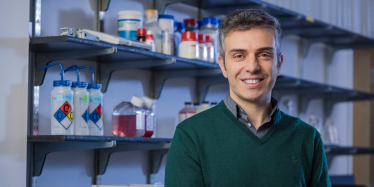Filippo Veglia, Ph.D.
-
Assistant Professor, Genome Regulation and Cell Signaling Program, Ellen and Ronald Caplan Cancer Center
Veglia’s research focus is the study of molecular and metabolic perturbations that drive the reprogramming of myeloid cells in the brain tumor microenvironment, with a final goal to identify novel therapeutic strategies to target immunosuppressive myeloid cells.
Filippo Veglia received his Ph.D. in Immunology and Applied Biotechnology from Tor Vergata University in Rome (Italy) and did his postdoctoral work at Wistar in the laboratory of Dmitry Gabrilovich at Wistar. In 2020, he joined Moffitt Cancer Center as an Assistant Member in the Department of Immuno-Oncology and as a Member of the Neuro-Oncology Program. In December 2023, Filippo joined Wistar as an Assistant Professor in the Immunology, Microenvironment and Metastasis Program, and in 2024, he joined the Genome Regulation and Cell Signaling Program. He is an expert in myeloid cells, tumor immunology, and metabolism, and he has a proven track record of publications studying the metabolic regulation of myeloid cell functions in cancer as well as exploring novel strategies for their therapeutic targeting (Nature Communications, Nature, and Journal of Experimental Medicine).
The Veglia Laboratory

The Veglia Laboratory
Glioblastoma (GBM) is the most aggressive and lethal form of brain cancer, which is characterized by a profound immunosuppressive tumor microenvironment (TME) that prevents the induction of effective anti-tumor immunity, thereby rendering these tumors highly resistant to immunotherapy.
Myeloid cells, which are the largest immune cell components of GBM tumors, are highly plastic and heterogenous in the TME. In response to the local clues provided by the TME, myeloid cells undergo an extensive remodeling of core energy metabolism and acquire an entire spectrum of metabolic and functional profiles. Such extensive metabolic adaptation is critical for myeloid cell functions in the TME.
Our lab focuses on the study of the TME-driven mechanisms responsible for the reprogramming of myeloid cells towards cells with immunosuppressive and pro-tumoral functions. Our current effort is to identify metabolic and molecular pathways shared by different immunosuppressive myeloid cells to enable the simultaneous targeting of these cells in the brain tumor TME, with final goals to restore anti-tumor immunity and boost the efficacy of immunotherapy.
-
Staff Scientist
Alessandra De Leo, Ph.D.
-
Postdoctoral Fellows
Barbara Peixoto, Ph.D.
Alessio Ugolini, Ph.D.
-
Postdoctoral fellow and research assistant positions are available in the Veglia Laboratory. Candidates should have recently received or be close to obtaining their Ph.D. degree or equivalent (for postdoc) or B.S. degree or equivalent (for RA) and have a strong background in in immunology, tumor microenvironment, and molecular biology. Interested applicants are invited to email: fveglia@wistar.org
Research
Project #1: Metabolic-driven post-translational modifications supporting the suppressive and pro-tumoral function of tumor-associated macrophages and neutrophils in brain tumors
Project #2: Brain tumor-driven mechanisms of phenotypic and functional heterogeneity of neutrophils
Project #3: Role of microglia during brain tumor progression
Project #4: Metabolic mechanisms of trained immunity in brain tumors
-
Staff Scientist
Alessandra De Leo, Ph.D.
-
Postdoctoral Fellows
Alessio Ugolini, Ph.D.
-
Predoctoral Trainees
Filippo Badii
-
Postdoctoral fellow and research assistant positions are available in the Veglia Laboratory. Candidates should have recently received or be close to obtaining their Ph.D. degree or equivalent (for postdoc) or B.S. degree or equivalent (for RA) and have a strong background in in immunology, tumor microenvironment, and molecular biology. Interested applicants are invited to email: fveglia@wistar.org
Lab in the News
Selected Publications
Glucose-driven histone lactylation promotes the immunosuppressive activity of monocyte-derived macrophages in glioblastoma
De Leo A, Ugolini A, Yu X, Scirocchi F, Scocozza D, Peixoto B, Pace A, D’Angelo L, Liu JKC, Etame AB, Rughetti A, Nuti M, Santoro A, Vogelbaum MA, Conejo-Garcia JR, Rodriguez PC, Veglia F. Glucose-driven histone lactylation promotes the immunosuppressive activity of monocyte-derived macrophages in glioblastoma. Immunity. 2024 Apr 30:S1074-7613(24)00211-5. doi: 10.1016/j.immuni.2024.04.006. Epub ahead of print. PMID: 38703775.
Analysis of classical neutrophils and polymorphonuclear myeloid-derived suppressor cells in cancer patients and tumor-bearing mice
Veglia F, Hashimoto A, Dweep H, Sanseviero E, De Leo A, Tcyganov E, Kossenkov A, Mulligan C, Nam B, Masters G, Patel J, Bhargava V, Wilkinson P, Smirnov D, Sepulveda MA, Singhal S, Eruslanov EB, Cristescu R, Loboda A, Nefedova Y, Gabrilovich DI. Analysis of classical neutrophils and polymorphonuclear myeloid-derived suppressor cells in cancer patients and tumor-bearing mice. J Exp Med. 2021 Apr 5;218(4):e20201803. doi: 10.1084/jem.20201803. PMID: 33566112; PMCID: PMC7879582.
Myeloid-derived suppressor cells in the era of increasing myeloid cell diversity
Veglia F, Sanseviero E, Gabrilovich DI. Myeloid-derived suppressor cells in the era of increasing myeloid cell diversity. Nat Rev Immunol. 2021 Aug;21(8):485-498. doi: 10.1038/s41577-020-00490-y. Epub 2021 Feb 1. PMID: 33526920; PMCID: PMC7849958.
Polymorphonuclear myeloid-derived suppressor cells limit antigen cross-presentation by dendritic cells in cancer
Ugolini A, Tyurin VA, Tyurina YY, Tcyganov EN, Donthireddy L, Kagan VE, Gabrilovich DI, Veglia F. Polymorphonuclear myeloid-derived suppressor cells limit antigen cross-presentation by dendritic cells in cancer. JCI Insight. 2020 Aug 6;5(15):e138581. doi: 10.1172/jci.insight.138581. PMID: 32584791; PMCID: PMC7455061.
Fatty acid transport protein 2 reprograms neutrophils in cancer
Veglia F, Tyurin VA, Blasi M, De Leo A, Kossenkov AV, Donthireddy L, To TKJ, Schug Z, Basu S, Wang F, Ricciotti E, DiRusso C, Murphy ME, Vonderheide RH, Lieberman PM, Mulligan C, Nam B, Hockstein N, Masters G, Guarino M, Lin C, Nefedova Y, Black P, Kagan VE, Gabrilovich DI. Fatty acid transport protein 2 reprograms neutrophils in cancer. Nature. 2019 May;569(7754):73-78. doi: 10.1038/s41586-019-1118-2. Epub 2019 Apr 17. PMID: 30996346; PMCID: PMC6557120.
Lipid bodies containing oxidatively truncated lipids block antigen cross-presentation by dendritic cells in cancer
Veglia F, Tyurin VA, Mohammadyani D, Blasi M, Duperret EK, Donthireddy L, Hashimoto A, Kapralov A, Amoscato A, Angelini R, Patel S, Alicea-Torres K, Weiner D, Murphy ME, Klein-Seetharaman J, Celis E, Kagan VE, Gabrilovich DI. Lipid bodies containing oxidatively truncated lipids block antigen cross-presentation by dendritic cells in cancer. Nat Commun. 2017 Dec 14;8(1):2122. doi: 10.1038/s41467-017-02186-9. PMID: 29242535; PMCID: PMC5730553.

